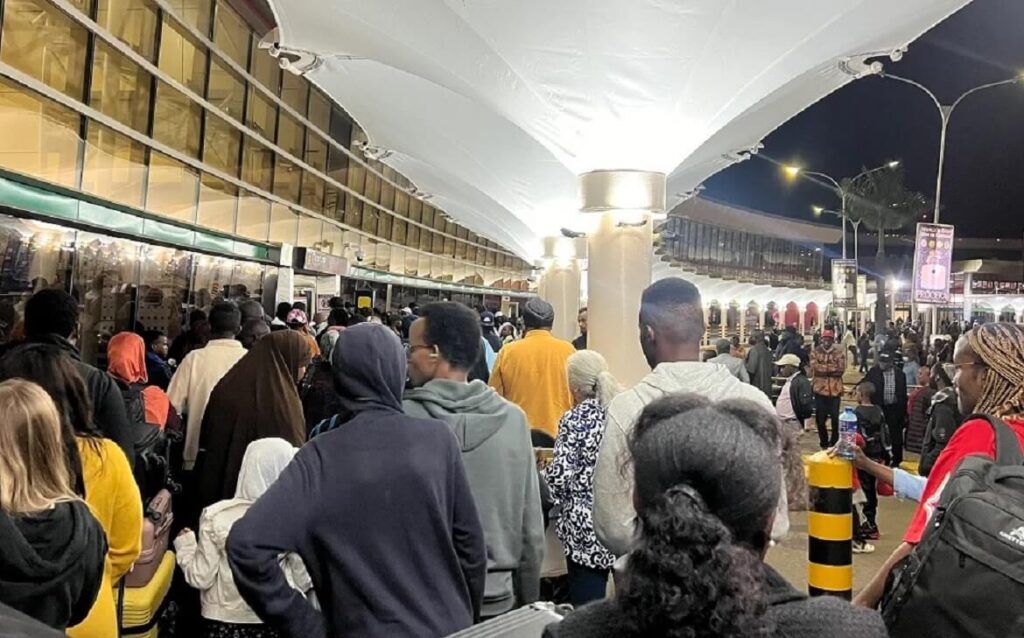By Shahzadi Irrum
Kenya has experienced significant unrest throughout the year, largely driven by the government’s economic policies, which have sparked protests and unrest, as they have disproportionately affected the poorest segments of society, increasing the burden on already strained households.

Recently, Kenya has seen a new round of protests at Nairobi’s Jomo Kenyatta International Airport (JKIA) — one of Africa’s busiest airports, that have infuriated Kenyans and sent the country’s aviation workers on strike, causing cancellations and delays in flights and stranding hundreds of passengers. The workers turned down the deal that was struck between the Kenyan government and Adani Group (one of India’s most politically influential conglomerates), owned by Gautam Adani. In this deal, the Kenyan government planned to lease the country’s main international airport to the Adani group.
According to a report by the Financial Times, Adani’s $1.85 billion proposal includes constructing and renovating airport infrastructure, adding a second runway, modernizing the passenger terminal, and potentially enhancing its taxiways. As a swap, Adani would secure the rights to operate the airport for 30 years. After 30 years, Adani will own around 20 percent equity share in the airport.
Adani has diverse interests in several publicly listed companies in sectors such as airports and ports, power generation, as well as coal and gas trading. He also enjoys strong ties with India’s ruling party, including their Prime Minister Narendra Modi. However, in recent years, Adani’s company has faced several high-profile scandals, including accusations of fraud and insider trading. Thus, this opinion piece aims to examine the strategy behind Adani’s JKIA deal and explore whether this agreement constitutes a boon or bane for Kenya.
The JKIA is Kenya’s largest airport, which handled nearly 10 million passengers and 400,000 tonnes of cargo in 2022-2023, this airport allegedly suffers from frequent power outages and leaking roofs, and its infrastructure urgently needs an upgrade. Consequently, Nairobi awarded a contract to the Adani group for necessary upgrades. Workers, however, are opposing the plan strongly, expressing concerns that the Adani acquisition of JKIA would lead to job losses and worsen the employment conditions for those who will remain. Besides, the few Kenyans who will be retained may be bound to accept “inferior terms and conditions of service” which will be more favorable to Adani.
There is a strong possibility that Adani Group may use various pretexts to evict Kenyans and hire other workers on its preferred terms, who will inevitably be from India. Other critics argue that the takeover would deprive taxpayers of future profits from the airport, which generates over 5 percent of Kenya’s gross domestic product (GDP) through its freight and passenger fees. For that reason, there is a strong worker outcry. They have vehemently denounced the deal, and their anger shows no signs of easing. They stated, “Adani must go. This is not something we can afford“.
On the flip side, Kenya’s government is defending this agreement. The government said the JKIA is operating above capacity and needs modernizing but it is not for sale. According to Kenyan government officials, JKIA was a “shame to the nation” and emphasized the urgent need for renovations. They also underlined that ” to draw more tourists to our country, we need airports like those in other developed economies.” However, Kenya’s high court is thinking differently. They have suspended the proposed deal and prohibited further implementation of the agreement. The agreement will now undergo a judicial review and the petition against it has been filed by two parties: The Law Societies of Kenya and the Kenya Human Rights Commission. They argue that the money needed for the airport’s upgrade could be raised independently and there is no need to lease the facility in any way.
If this agreement is scrutinized carefully, it becomes clear that the JKIA deal may prove a bane to Kenya’s economic growth and development. It also becomes apparent that entering into a partnership with an investment group that has a history of serious allegations of fraud would be equivalent to pushing Kenya further back. There is a high likelihood that this agreement will turn out to be a lose-lose situation, that will have devastating consequences for Kenya’s economy, and its effects will be felt for a long time.
So we are justified in understating that this agreement indicates a misstep by the Kenyan government, creating an impression that Kenya is just a few steps away from heading towards destruction. In the end, the agreement’s implications are alarming, and one can’t help but wonder if the Kenyan government has considered the long-term consequences of its plans.
Author: Shahzadi Irrum – Assistant Research Fellow (Balochistan Think Tank Network, Quetta.
(The opinions expressed in this article are solely those of the author and do not necessarily reflect the views of World Geostrategic Insights).







